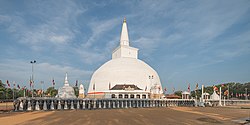 | |
| Total population | |
|---|---|
| 14,272,056 (70.2%) in 2012[1] | |
| Founder | |
| Gautama Buddha | |
| Religions | |
| Theravada Buddhism | |
| Scriptures | |
| Pāli Canon | |
| Languages | |
| Part of a series on |
| Theravāda Buddhism |
|---|
 |
| Buddhism |
Theravada Buddhism is the largest and official religion of Sri Lanka, practiced by 70.2% of the population as of 2012.[2] Practitioners of Sri Lankan Buddhism can be found amongst the majority Sinhalese population as well as among the minority ethnic groups. Sri Lankan Buddhists share many similarities with Southeast Asian Buddhists, specifically Myanmar Buddhists and Thai Buddhists due to traditional and cultural exchange. Sri Lanka is one of five nations with a Theravada Buddhist majority.
Buddhism has been declared as the state religion under Article 9 of the Sri Lankan Constitution which can be traced back to an attempt to bring the status of Buddhism back to the status it enjoyed prior to the colonial era. Sri Lanka is one of the oldest traditionally Buddhist countries.[3]
The island has been a centre of Buddhist scholarship and practices since the introduction of Buddhism in the 3rd century BCE producing eminent scholars such as Buddhaghosa and preserving the vast Pāli Canon. Throughout most of its history, Sri Lankan kings have played a major role in the maintenance and revival of the Buddhist institutions of the island. During the 19th century, a modern Buddhist revival took place on the island which promoted Buddhist education. Due to the island's close ties with India, Sinhalese Buddhism has been in part influenced by Hinduism and indigenous beliefs, and some Buddhists share similar beliefs with Hindus, such as the worship of Hindu deities, the caste system, and Animism. Pre-Buddhist historical accounts of Sri Lanka reveal a significant impact of Indian religious trends on the society of Lanka.[4] Some traditional Sinhalese Temple layout also includes individual shrines dedicated to Hindu gods. Some of the most important Hindu gods worshipped by some Sinhalese Buddhists include Vishnu, Murugan, Pathini, Nata, Gambara, Dedimunda, Saraswati, Ganesh, Lakshmi, Shiva, Kali, etc. Demons and spirits are also invoked during Exorcisms and rituals, which seem to be customs passed down from Pre-Buddhist indigenous times. In 2007, there were around 6,000 Buddhist monasteries in Sri Lanka with approximately 15,000 monks.[4]
- ^ "Population by religion and district, Census 1981, 2001, 2012" (PDF). Department of Census and Statistics of Sri Lanka. Retrieved 20 February 2016.
- ^ Pew Forum (2 April 2015). "The Future of World Religions: Population Growth Projections, 2010–2050". www.globalreligiousfutures.org. Archived from the original on 28 July 2014. Retrieved 12 January 2021.
- ^ "Census of Population and Housing of Sri Lanka, 2012 – Table A4: Population by district, religion, and sex Archived 29 December 2014 at the Wayback Machine" (PDF). Department of Census & Statistics, Sri Lanka.
- ^ a b "Buddhism in Sri Lanka: A Short History". www.accesstoinsight.org. Archived from the original on 22 April 2021. Retrieved 24 April 2022.